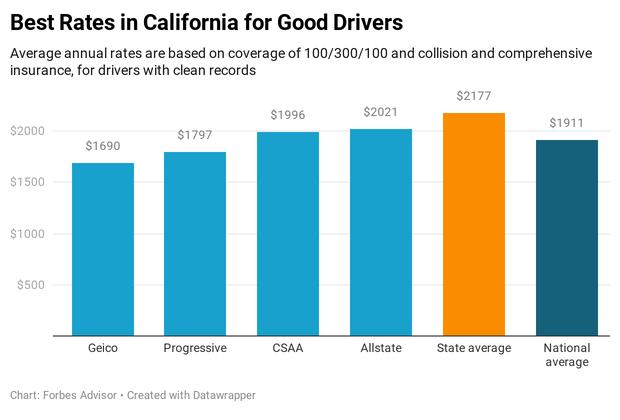How to get the cheapest car insurance in California (2021)
California is a state of infringement or fault. The party at fault shall be responsible for the damages of the other party.
The latest data on average California car insurance rates shows drivers pay about $957.08 per year for policies, which is just under the nationwide average.
State minimum coverage requirements include bodily injury liability of $15,000 per person and $30,000 per accident, plus property damage liability of $5,000 per accident.
If you’ve ever tried to get anywhere in California, you know the easiest way is by car. With so many drivers on the road, it’s essential to find the best car insurance in California to keep you covered after an accident.
In 2018, the local Department of Motor Vehicles (DMV) counted over 25 million registered automobiles and over 27 million issued driver’s licenses. Like most states, California requires anyone who drives to have car insurance, and there there are many insurance options to choose from.
In this guide, we’ll help you narrow down your options by outlining the best insurers in the state, typical costs of car insurance in California, state minimum coverage requirements, and more. If you want to get free quotes right away, fill out the form below to start comparing prices from multiple California car insurance providers.
What Is The Required Car Insurance in California?
DMV Self-Insurance Certificate
What Are Car Insurance Laws in California?
How Do California Car Insurance Rates Compare to Other States?
What Determines California Car Insurance Rates?
How Do You Get the Best Rates in California?
California Low Cost Automobile Insurance Program (CLCA)
California Automobile Assigned Risk Plan (CAARP)
Good Driver Discount
Who Are The Best Car Insurance Providers in California?
GEICO: Best Overall
Progressive: Best for High-Risk Drivers
Mercury: Best Local Provider
What Is The Required Car Insurance in California?
When it comes to car insurance, California requires all drivers to have a policy with at least two types of liability coverage. In general, liability insurance helps pay for any damage to other drivers, their passengers, and their property in accidents where you are responsible. There are two types of liability coverage:
Bodily injury liability (BI): Covers any injuries sustained by another person resulting from an accident you caused
Property damage liability (PD): Covers any damage to another person’s property, most often their car, resulting from an accident you caused
The California state minimum requirements for auto insurance coverage are:
BI: $15,000 per person
BI: $30,000 per accident
PD: $5,000 per accident
While these are the minimum car insurance requirements in California, it’s important to note that liability auto insurance only protects the other party – it doesn’t pay for any damage to you or your vehicle. Furthermore, the minimum usually isn’t enough to cover all the costs after an accident, and you may still be required to pay a sizable balance.
When it comes to auto policies, the best practice is to get the highest coverage you can afford in order to be fully protected. You may want to consider other types of car insurance, such as comprehensive coverage, collision coverage, or underinsured/uninsured motorist coverage alongside the state minimums.
DMV Self-Insurance Certificate
An alternative to having car insurance in California is proving you can be financially responsible to cover any potential accident.
California’s DMV recognizes the following types of financial responsibility:
$35,000 cash deposit with DMV
DMV-issued self-insurance certificate
$35,000 surety bond from a company licensed to do business in California
These alternatives eliminate the need to pay monthly premiums and are good for those unable to get standard auto insurance (e.g., they have a rare car). However, they can be much pricier. In an at-fault accident that exceeds $35,000, the driver is required to pay the balance out of pocket.
In most cases, standard California auto insurance is the simplest and most convenient way to prove financial responsibility.
What Are Car Insurance Laws in California?
When it comes to dealing with car accidents, California is a tort or at-fault state. A tort state requires that a party must be proven to be at fault for the accident before their insurance provider will pay for damages.
The party at fault is legally responsible to pay for all the other party’s damages, including medical expenses, property repairs, lost wages, and the like.
Oftentimes, a single party can’t be proven to be at fault. In these cases, California operates as a pure comparative negligence jurisdiction, where each party will be held responsible for their fault in the accident. For example, if the court finds you at fault for 20% of an accident, you will only be paid $8,000 out of a total of $10,000 in damages.
While tort state law does require more time to reach a resolution, it generally results in a fairer outcome for all parties involved.
Like most states, California also has strict laws regarding driving under the influence of alcohol or drugs. If you are charged with a DUI, it can stay on your record for 13 years and will significantly raise the cost of your California car insurance. Additionally, the state’s distracted driving laws make it illegal to call or text while driving, unless the phone is in hands-free mode. Violating these laws can also result in marks on your driving record.
In California, it is illegal for drivers of any age to call or text while driving, unless the phone is in hands-free mode.

How Do California Car Insurance Rates Compare to Other States?
When it comes to auto insurance rates, California falls just below the U.S. average. According to the most recent data from the National Association of Insurance Commissioners (NAIC),
in 2017, drivers spent an average of $957.08 per year for car insurance in California. This is slightly less than the national average, which was $1,004.58.What Determines California Car Insurance Rates?
In most states, auto insurance rates are generally based on a number of rate factors, from where you live to your credit score. However, in California, it’s illegal for auto insurance rates to be based on gender, zip code, or credit history.
Instead, providers must only consider the following when calculating car insurance premiums:
Driver’s safety record
Total miles driven annually
Years of previous driving experience
Any other factors that can be proven to have a substantial relationship to the risk of loss
How Do You Get the Best Rates in California?
Although driving in certain California cities can be a pain (Los Angeles, San Francisco, and San Diego, specifically), the state does offer a few ways to help its drivers get the lowest California car insurance rates.
Below are three state-sponsored programs intended to reduce car insurance costs.
California Low Cost Automobile Insurance Program (CLCA)
Residents who have trouble meeting the state minimum for car insurance in California may be eligible for the California Low Cost Automobile Insurance Program (CLCA). To qualify for the program, you must meet the income guidelines, own a vehicle valued at a maximum of $25,000, and have a good driving record.
If eligible, you will only be required to meet a lower minimum coverage:
BI: $10,000 per person
BI: $20,000 per accident
PD: $3,000 per accident
Under the CLCA, you can expect to pay an annual premium between $244 and $966, depending on the county in which you live.
California Automobile Assigned Risk Plan (CAARP)
Even high-risk drivers can get help from California state programs. In cases where a driver has difficulty finding affordable car insurance due to previous traffic violations, the California Automobile Assigned Risk Plan (CAARP) offers assistance.
The CAARP assigns the high-risk driver to one of their affiliated insurance companies, which agrees to charge reasonable premiums through an installment plan. Then, in a few years when the traffic violations are removed from their record, the driver will be able to secure more affordable auto insurance rates on their own.
Good Driver Discount
California’s Proposition 103 was passed in November 1988 to protect consumers against any unreasonable treatment from insurance companies. This led to lower rates, fair policy premiums, and a sizable 20% good driver discount.
To qualify for 20% off any California car insurance plan, the driver must meet the following:
Have had a driver’s license for the past three years
Have not had more than one violation in the past three years (insurance providers may count any accident that you had that included more than $500 in damages as a violation)
Have not been principally at fault in any accident that resulted in injury or death in the past three years
Have not been convicted of driving under the influence of alcohol or drugs in the past seven years
Aside from California’s programs, it’s always best to shop around with reputable providers for the best auto insurance rates. Most insurance companies offer discounts like ones for students, teachers, members of the military, or members of affiliated clubs and companies.
Some providers also offer discounts for specific vehicles, drivers with low mileage – an estimated savings of $81 for every 5,000 fewer miles driven a year, according to Consumer Federal of America – and bundling multiple policies. Look for a provider that offers at least one of these options, as well as reasonable premiums and deductibles.
Who Are The Best Car Insurance Providers in California?
Many great car companies offer car insurance in California. If you want to find the best price, it helps to compare at least three quotes from different companies. To help you get started, we’ve narrowed down three providers that offer great customer service, cheap car insurance plans, and a variety of coverage options.
GEICO: Best Overall
GEICO consistently ranks as one of the most popular and most affordable car insurance providers. The company receives an A++ for financial strength from AM Best, an A+ for business ethics from the Better Business Bureau, high scores in J.D. Power surveys, and other notable ratings. The average GEICO policy in California is $1,352.60, depending on the driver and desired coverage, according to U.S. News & World Report.
Progressive: Best for High-Risk Drivers
Progressive is a popular provider, not just for cheap car insurance but for its useful online features and handy apps. Customers can use Progressive’s Name Your Price
®
tool to find a policy that fits their budget or its Snapshot
®
mobile app to see helpful tips about driving behavior. Progressive provides one of the cheapest car insurance policies in California, with an average policy costing $1,292.14.
Mercury: Best Local Provider
Founded in 1962, Mercury is positioned as one of California’s leading independent providers for automobile insurance. While it has since expanded to other states, California still counts for 80% of the company’s revenue. The provider offers all standard types of coverage, add-ons like roadside assistance, and several discounts. Mercury also claims to save drivers an average of $769 as compared to other providers. However, it’s still best for drivers to contact them directly for an actual quote.
California operates under many state-specific auto insurance laws, which affect the types and policies of insurance you should carry. To find the best California car insurance rates, please fill out the free form below and start learning more about your available options.
-
Latest
 2022 Genesis G70 overview: style update, new standard equipment and pricing information
2022 Genesis G70 overview: style update, new standard equipment and pricing informationIt’s no secret that we like the 2020 Genesis G70 on Automoblog. It combines the solemn and sporty styling of the G70, the torque-rich engine, and the availability of a manual gearbox, which makes our...
-
Next
 2010 Ferrari 420 Dino-final confirmation
2010 Ferrari 420 Dino-final confirmationFinally! We got news that Ferrari does indeed plan to create the Dino concept car that has been spying on recently. Unfortunately, there are not many confirmed details, but we do have some generally a...
